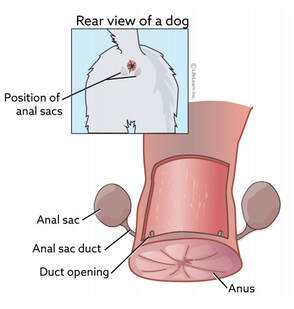Anal Gland Disorders
The "anal glands" are are actually small sacs that are lined with glandular tissue. The glands secrete fluid which is stored in the sac until it is ready to be "released."
|
These sacs are located on either side of the anus, under the skin and muscle. They connect to the anal opening by means of small canals (ducts).
In skunks, there is a large degree of voluntary control, and they are used for defense. In dogs and cats, their purpose is to "scent mark" their territory to let other animals know not to intrude. The pressure of the bowel movement and the contractions of the muscles around the anus will cause normal emptying of the sacs. If, for whatever reason (abnormal bowel movements, narrow ducts, tumors, obesity, allergies...), this natural emptying does not occur, the sacs will become distended with secretion. Discomfort or infection (and "scooting") may follow. |
|
Diseases of the anal glands include:
|
Symptoms can include:
|
Often groomers will "empty" the sacs if you mention that your dog is "scooting." They usually express the sacs without entering the rectum (called external expression) by applying pressure on the skin over the sacs. This may not always fully empty the glands. Incomplete expression of the sacs can lead to sacculitis or abscess in some pets. If you find that this is required more often than once every 6-8 weeks, please consult your veterinarian. Your veterinarian can express the glands internally (via rectal palpation) and be sure they are emptied completely. Your veterinarian will do a complete physical exam, including palpating the sacs and ducts, to determine the underlying cause of the ongoing problem.



